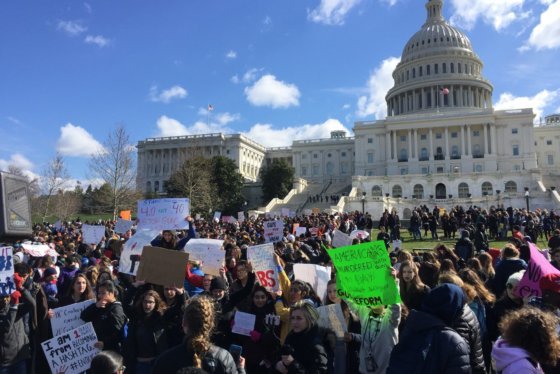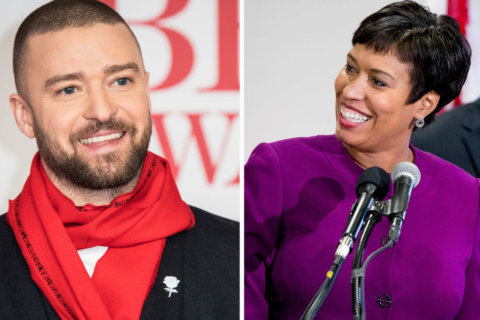WASHINGTON — As the March For Our Lives is set to begin in D.C. Saturday, a new poll finds that gun violence, including in school, is the biggest fear young people face.
A USA Today poll of young people ages 13 to 24 found that gun violence came in ahead of terrorism, racism, climate change and paying for college.
“Maybe we shouldn’t be surprised at the way school violence has defined this generation,” USA Today Washington bureau chief Susan Page, who wrote about the poll for the paper, told WTOP Thursday, noting that even the oldest participants in the survey began school after the Columbine High School shootings in 1999. “Throughout their school careers, this has been a reality that they’ve lived with.”
Some of the numbers from the poll, as well as the interviews with those surveyed, are sobering.
About 80 percent of the polled students between ages 13 and 17 said they’ve had a “serious talk” with their parents or guardians about how to deal with a shooting in school — way up from the 38 percent in the 18-to-24 group.
The poll found 19 percent of the young people said they don’t feel safe at school; 25 percent said it’s very likely or somewhat likely that one of their classmates will bring a gun to school.
Justin McDonnall, 17, described his hometown of Hymera, Indiana, as “Nowhere USA,” but told USA Today that even there, the police spent two days at his school because another student made verbal threats of gun violence. “I watch over my shoulder, because you never know.”
“Some other kids take it as a joke but I take it seriously because you never know what could happen,” Cornelius Collie, 13, of Tutwiler, Mississippi, told USA Today. “Like in Florida, I bet no one took it seriously until it happened.
The young people surveyed had opinions on what should be done about school shootings, as well.
Strong majorities of both age groups thought schools should be required to hold active-shooter drills, and that people who have been treated for mental illness should be prohibited from owning guns. The question of whether tightening gun control laws and background checks would help prevent mass shootings drew a basically evenly mixed response.
Both age groups overwhelmingly thought schools should have armed police officers; equally strong majorities thought teachers should not be armed.
‘They need to do this themselves’
One-third of the young people surveyed said they will participate, in person or via social media, in Saturday’s March for Our Lives. Page said that if that percentage holds nationwide, it would be “the kind of protest that we’ve never seen before in this country.”
The young people she spoke to “feel the adult leaders of this country … have failed them. Neither party gets a very good rating” in the poll, Page said. “President Trump doesn’t either,” she added, saying that young people were “feeling like they need to do this themselves.”
Another difference seen among the younger people: “The idea that nothing can work, which I think a lot of older people have when it comes to gun laws — they don’t have that sense. They believe that activism can make a difference.”
Julian Perez, 23, of Corpus Christi, Texas, speaking of youthful activism, told USA Today that “Some people were saying, ‘It’s great they care so much about politics,’ and as soon as they hear something they don’t like, it’s, ‘Well, you guys are just eating Tide pods; you shouldn’t be talking.”
The pollsters surveyed 1,112 people ages 13 to 24, including more than 600 students in middle school and high school. Parents gave their permission for minor children to be interviewed. The margin of error was plus or minus 4.5 points for those under age 18, 5 points for those 18 to 24 and 3.4 points for both combined.









